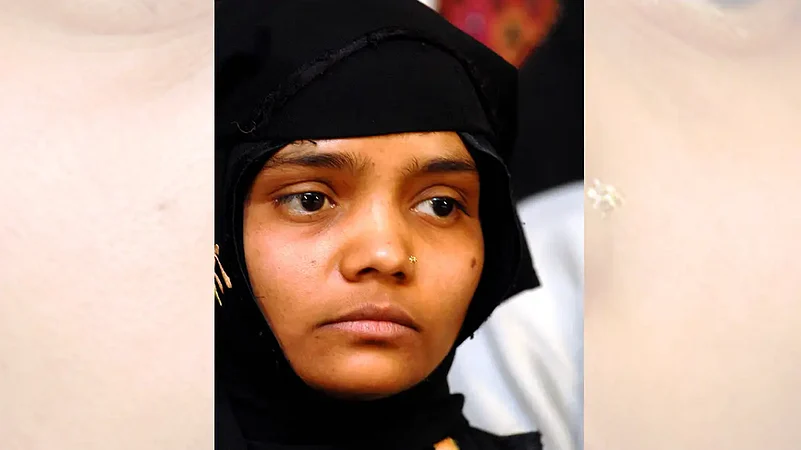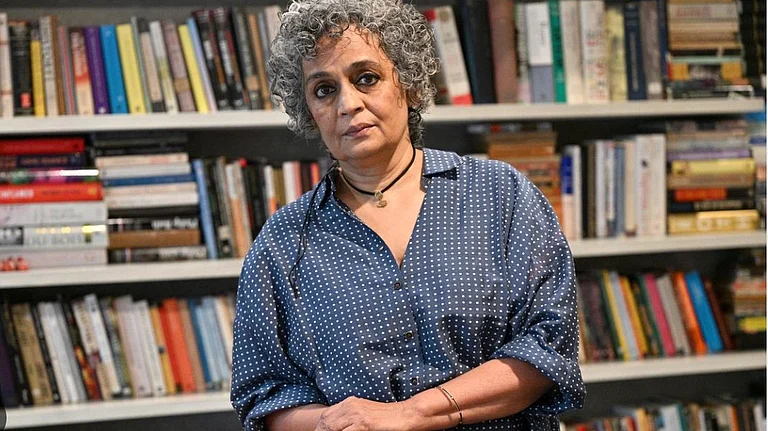The premature release of the 11 convicts in the case of the 2002 gang rape of Bilkis Bano and the murder of her seven family members on August 15, caused a massive uproar among lawyers, activists, journalists and Opposition parties across India. The Gujarat government had allowed their release under its 1992 remission policy. Yakub Rasul, the husband of Bilkis, told this correspondent that the decision has shaken them up because it not only defeated their purpose of seeking justice, but also put the safety of his family at stake. “We were not aware of the release of the convicts; nobody had told us. We got to know through local media reports,” Rasul tells Outlook, adding, “We are scared for our lives, and don’t know what will happen to us now,” adds Rasul. Bilkis was not available for comment.
Among those critical of the state government’s decision is Justice U.D. Salvi, the former Bombay high court judge, who as trial judge convicted the 11 men and sentenced them to life imprisonment in 2008. Salvi says this move not only sets a bad precedent, but will have wide ramifications.
“This is utterly wrong. Now, convicts in other gang rape cases would seek similar relief,” the judge was quoted saying by several media reports. “Certainly, this is an irony. Our prime minister spoke of women’s empowerment, and the state from where he comes released these men who gang-raped a helpless woman,” he added. Experts say the convicts would not have been released had the state government followed the current remission policy, formulated in 2014.
Ongoing timeline
Back in 2002, local police officers repeatedly refused to register Bano’s case, citing a lack of evidence and threatening her with legal action if she persisted. However, in December 2003, Bano approached the National Human Rights Commission (NHRC) and filed a plea before the Supreme Court, which directed the Central Bureau of Investigation (CBI) to investigate the case. After the CBI arrested the accused in 2004, Bano raised apprehension of the possibility of evidence-tampering and potential harm to witnesses. Subsequently, the case was transferred from Ahmedabad in Gujarat to Mumbai in Maharashtra.
A special CBI court in Mumbai sentenced the accused to life imprisonment on the charges of gang rape and murder in January 2008. The Bombay high court maintained the conviction of the accused in 2017, and in 2019, the SC ordered the Gujarat state government to compensate the victim with Rs 50 lakh, a job, and a house. Then in April 2022, Radhesham Shah, one of the convicts, approached the SC and appealed for premature release, pleading that he had been in jail for over 15 years. The apex court maintained that since the crime was committed in Gujarat, its state government was the appropriate authority to examine Shah’s plea, and maintained that the Gujarat government should consider the plea under the state’s remission policy of 1992.
Controversial remission
Following the apex court’s directions, the Gujarat government formed a committee that later recommended that the sentences of all 11 convicts in the case be remitted. The 11 convicts walked out of Godhra sub-jail on August 15. Reportedly, a jail advisory committee was set up by the state government, comprising two MLAs from the ruling BJP—C.K. Raulji and Sumanben Chauhan. The committee, as per several media reports also included three members—Pavan Soni, Sardarsinh Baria Patel, and Vinitaben Lele—whom the official notification called “social workers”. However, all three are members of the BJP. This stoked a controversy as several Opposition leaders and activists maintained that half of the committee’s members were associated with the ruling party, and that the move was a vote-garnering gimmick, what with Gujarat slated for polls later this year.
As per Gujarat’s remission policy of 1992, for eligibility to seek the remission of a sentence, two factors are important. Firstly, the convict must have finished serving a minimum 14-year jail term, and secondly the convict must have exhibited improvement in his behaviour inside the penitentiary. However, Shobha Gupta, an advocate who has represented Bilkis Bano, tells Outlook that the release of the convicts is shocking on many grounds. “Although the 1992 policy maintains that the completion of serving the 14-year sentence is mandatory for seeking remission, it does not mean completing the sentence or showcasing improved behaviour is the basis of release. It only makes you eligible for seeking remission,” she says.
To assess whether the convict should be set free or not, other factors are to be taken into the consideration, involving the “gravity of the crime, victim’s safety, and the impact of convict’s freedom on the social order,” says Gupta.
It appears, the advocate tells Outlook, that all these factors were overlooked. “The government has treated the criteria of eligibility for seeking remission as the criteria for setting the convicts free. The committee ought to have assessed the gravity of the perpetrated crime—as to how heinous it is to kill 14 people and gang rape a pregnant woman,” Gupta. Another factor, she adds, was to consider whether the victim would be safe after the convicts are released, given the fact that they live in the same village. She adds, “Remission is not a matter of right, as the apex court has repeatedly said. It is a reward granted to a convict for passing specific requirements. The committee has overtly misused the criteria for eligibility to remission as a license for setting the convicts free.”
Justice reversed?
Rasul says the Gujarat government’s decision shattered their belief in the justice system. “For 18 long years, we fought just to seek justice. This decision brought us back to the point where we had started—the state of fear and uncertainty. We had just begun living a normal life, and now we don’t know what the future has for us,” Rasul tells Outlook.
On August 17, advocate Gupta released a statement on behalf of Bano. “The trauma of the past 20 years washed over me again when I heard that the 11 convicted men who devastated my family and my life and took from me my three-year-old daughter, had walked free. No one enquired about my safety and well-being, before taking such a big and unjust decision. Give me back my right to live without fear and in peace. Please ensure that my family and I are kept safe,” Bano said in the statement.
Meanwhile, the Supreme Court on August 23 said it would look into a request to take up for urgent hearing the petitions which challenged the remission. Subhashini Ali, Communist Party of India (Marxist) Politburo Member, Trinamool Congress Lok Sabha MP Mahua Moitra and another petitioner filed the Public Interest Litigation (PIL).
Senior advocates and Congress party leaders, Kapil Sibal and Abhishek Singhvi—who were representing Ali and Moitra, respectively—and advocate Aparna Bhat, made arguments against the granting of remission and the subsequent release of convicts before a bench presided over by Chief Justice N.V. Ramana.
(This appeared in the print edition as "The Trials & Tribulations of Bilkis Bano")


























